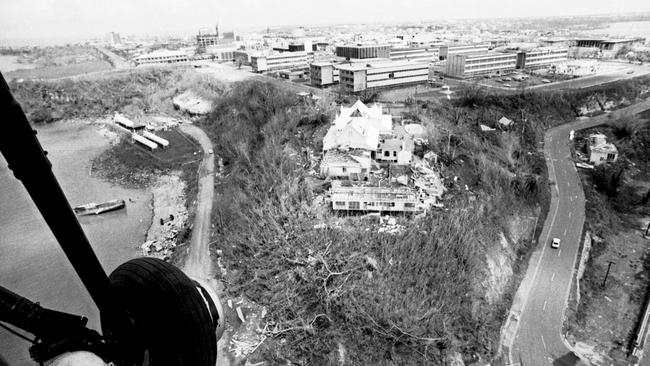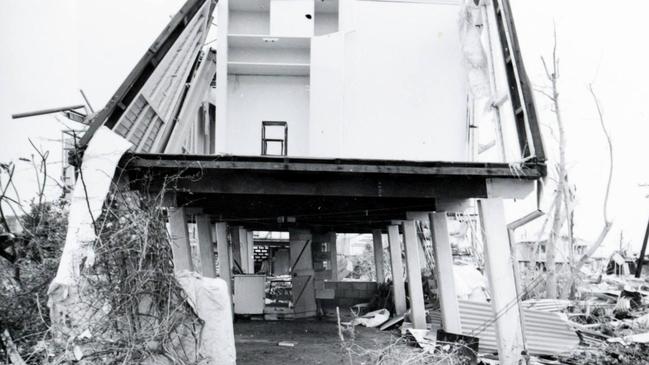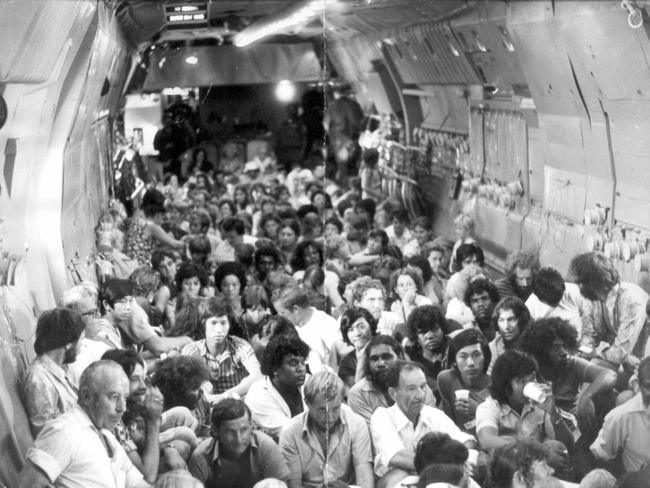Robin Trenerry recounts recovery mission after Cyclone Tracy
On Christmas Day, 1974, Robin Trenerry was enjoying some well-earned R&R with his wife’s family in Sydney when his brother-in-law burst in with some news from up north. Minutes later, he was called in for duty.

News
Don't miss out on the headlines from News. Followed categories will be added to My News.
On Christmas Day, 1974, Robin Trenerry was enjoying some well-earned R&R with his wife’s family in Sydney when his brother-in-law burst in with some news from up north.
“Cyclone in Darwin,” he said.
Trenerry was confused.
“Yeah, weeks ago,” he replied, having just arrived from Darwin on annual leave a day earlier.
In early December, Severe Tropical Cyclone Selma had threatened Darwin, where Trenerry had been stationed as a corporal in the Royal Australian Air Force, but fizzled out over the water. “No, now,” his brother-in-law said.
“As we were speaking, the phone rang and it was the air movements office in Richmond and they said ‘Pack your bag, you’re coming back to Darwin’,” Trenerry recalls from a Darwin retirement village almost 50 years later. “I’d only just got there the day before.”
The order came down the line – “We’ve got a cyclone, you’re needed back in Darwin, there’ll be a car to pick you up in about half an hour” – and with that, Trenerry reported for duty.
RAAF Base Richmond was a “hive of activity” with “planes going everywhere” and Trenerry’s first job was to log inventory destined for the disaster zone on a C-130 Hercules “packed to the gunnels with medical equipment”.
“They said, ‘You’re on that plane there’, there were about four of them lined up, and they gave me a rundown of what had happened and I sat on a pile of medical equipment,” he recalls.
“There must have been about 30 of us, doctors and nurses and Christ knows what.”

As decimated Darwin appeared underwing, it became clear there was a problem already: “We can’t land because there’s too much debris on the strip”.
After circling overhead until the runway was cleared, the Herc was greeted on the tarmac by Trenerry’s mate and fellow NCO, Corporal Kerry “Trumby’” Farrow.
“I thought ‘What the bloody hell’s going on?’ and he said ‘The town’s been blown off the map’.
“There’s aircraft upside down all over the place and he said ‘Right, I’ve been given instructions to tell you you’re to clean it up’.
“But first of all, I’d better show you your house,” Trumby said.
“I said ‘Have you been down there?’. He said ‘Yep, it’s pretty much not there’, so we went down and he was right.”
As president of Darwin Airman’s Club, one of Trenerry’s next duties was to check “the waterhole” to “make sure all the grog was under lock and key” but Trumby added we’d “be lucky to get there and he was right, it was a nightmare getting anywhere”.
“The problem is, a lot of people don’t realise that when you go home at night, when you leave work, how do you know where you’re going?” he says.
“You’re going to where you live but how do you know how to get there? You get there with a red house, a green fence, and you do it subconsciously and that’s what you did here. The only problem was there were no houses, there were no street signs, the trees were gone.”
Next on the agenda was “to make room for the press”. “The ABC have got a crew landing as we speak, go and pick ‘em up and sort ‘em out.”
Once the pressmen were situated, Trenerry press ganged a couple of fellow airmen – “What are you blokes doing, get in here, you’ve got a job now for as long as I tell you” – and tried to find “a house that wasn’t too bad”.
“I rounded up a few of the cooks, all the cooking gear was bottled gas, they cleaned out the kitchen and it just started to operate,” he says.
“More media are arriving they’d just chartered flights from everywhere and it was like that for quite a while.”
Enter stage left, Major General Alan Bishop Stretton “to run the show”.
“He came to town and first thing he said was ‘I want somebody who can run around town and do little jobs for me’ and he looked at me,” Trenerry says.
“So I had a Mini Moke that I got from down at transport and I spent the next several weeks running around chasing after him.”

Another of Trenerry’s responsibilities at the time was organising the evacuation of the women and children.
“By that time all the Hercs and all the other aeroplanes had come back to Darwin, do your manifest up, women and children, get on this plane, get on this plane and I spent probably seven to 10 days on an aeroplane and never got off it because this was the evacuation plane,” he says.
“They’d be asking me ‘Where’s it going?’, I’ve got no idea, it’s going to Brisbane, Sydney, Melbourne or Adelaide – ‘People will be there to look after you, you’ll be looked after’ – and they were.
“They’d get down there, unload and next thing you know there’d be trays and trays of sandwiches come on the plane from the defence messes in whichever city they landed in.”
But not every member of the fairer sex was evacuated and the wife of a local minister “kept a few women behind” to set up a laundry under the airman’s mess.
“The women did all the washing, ironing, they did a fantastic job,” Trenerry says.
“The people who banded together to provide meals, builders like Leo Venturin, he set up a soup kitchen on the highway, free meals, didn’t ask where you were from, nothing, I couldn’t believe the generosity of people.”
By early February a broken hand suffered in an at times less-than-friendly soccer match put an end to Trenerry’s part in the clean-up. “The CO said ‘You can’t stay’, I said ‘But I’ve got to stay, I’ve got so much to do’ and he said ‘You’ve done everything you can, you’re going’,” he says.
But after four years with the RAAF in Melbourne, Trenerry decided he’d “had too much fun in Darwin” and returned to the Territory as a NT Police recruit, spending the next 22 years in a different blue uniform.
He died at home in Darwin on July 17 this year aged 81.
Originally published as Robin Trenerry recounts recovery mission after Cyclone Tracy



